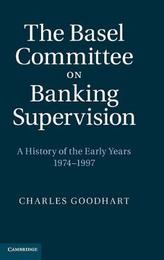
|
The Basel Committee on Banking Supervision: A History of the Early Years 1974-1997
Hardback
Main Details
| Title |
The Basel Committee on Banking Supervision: A History of the Early Years 1974-1997
|
| Authors and Contributors |
By (author) Charles Goodhart
|
| Physical Properties |
| Format:Hardback | | Pages:618 | | Dimensions(mm): Height 231,Width 155 |
|
| Category/Genre | Banking |
|---|
| ISBN/Barcode |
9781107007239
|
| Classifications | Dewey:332.1 |
|---|
| Audience | | Professional & Vocational | |
|---|
| Illustrations |
35 Tables, black and white; 36 Line drawings, unspecified
|
|
Publishing Details |
| Publisher |
Cambridge University Press
|
| Imprint |
Cambridge University Press
|
| Publication Date |
25 August 2011 |
| Publication Country |
United Kingdom
|
Description
The Basel Committee on Banking Supervision (BCBS) sets the guidelines for world-wide regulation of banks. It is the forum for agreeing international regulation on the conduct of banking. Based on special access to the archives of the BCBS and interviews with many of its key players, this book tells the story of the early years of the Committee from its foundation in 1974/5 right through until 1997 - the year that marks the watershed between the Basel I Accord on Capital Adequacy and the start of work on Basel II. In addition, the book covers the Concordat, the Market Risk Amendment, the Core Principles of Banking and all other facets of the work of the BCBS. While the book is primarily a record of the history of the BCBS, it also provides an assessment of its actions and efficacy. It is a major contribution to the historical record on banking supervision.
Author Biography
Charles Goodhart CBE, FBA is Emeritus Professor of Banking and Finance and a member of the Financial Markets Group at the London School of Economics and Political Science, having previously served as the group's Deputy Director from 1987 to 2005. From 1985 until his retirement in 2002, he was the Norman Sosnow Professor of Banking and Finance at the LSE. Before moving into academia he worked at the Bank of England for seventeen years as a monetary advisor, becoming a chief advisor in 1980.
Reviews'Mr Goodhart has produced an in-depth and comprehensive narrative on the history of the world's banking regulator. A compelling account in its own right, his description of the evolution of the Basel standards is as relevant as ever as policymakers contemplate sound responses to the recent crisis.' Jaime Caruana, General Manager, Bank for International Settlements 'Since the progressive lifting of exchange controls in 1970s and 1980s, few international financial institutions have mattered more than the Basel Supervisors Committee. There could be no one better to chart its history than Charles Goodhart - economist of money and banking, policymaker, and friend and colleague of many of the key protagonists. The highs and lows are all brought out, including how ideas sometimes get given too much or not nearly enough weight. This is a 'must-read' for anyone who wants to grasp how international finance policy gets made in the real world.' Paul Tucker, Deputy Governor, Financial Stability, Bank of England 'Charles Goodhart is unique in combining sound economic analysis with understanding of the practical, political and organizational pressures bearing on financial policy making. His history of the early years of the Basle Committee, culminating in international agreement on bank capital standards, is a case in point. It casts light on the obstacles faced by the negotiators of new international standards, for capital, derivatives and other elements of international financial reform.' Paul A. Volcker, Chairman of the President's Economic Recovery Advisory Board, 2009-2011 'It will aid historians as much as contemporary readers in search of insight into how international standard-setting works in a world of national jurisdictions and pride.' Financial World 'Goodhart has provided neither a narrative nor analytical history, but rather an invaluable, roughly chronological encyclopedia of key ideas, recollections, and documents for an audience of economists, political scientists, historians, regulators, finance ministers, and of course, the central bankers and regulators who comprise this powerful Committee.' The Oxonian Review
|